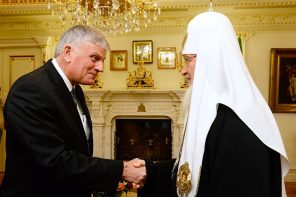If you watch a lot of cable TV news, it’s easy to see how you could believe that the only people who are Christians are straight, conservative, white people who consistently vote Republican. Finding a voice from the religious left on the cable gab shows is often like finding a unicorn or a pot of gold. We’ve heard of it, but rarely see it. Those of us on the religious left know that we exist, of course, but we so often feel like we’re a voice crying in the wilderness.
A new study from the University of Florida may just be the amplification of our voice that we need. It confirms that there is a growing religious left in this country and dispels the “God gap” theory “that white religious Christians are conservative and more likely to vote Republican, said UF researcher Kenneth Wald.”
”We are able to uncover considerable evidence of a religious left among Christians, and the big news is that it matters electorally,” Wald said. “Having a strong communitarian view of faith is associated with voting for Democratic candidates. Because of favorable political circumstances, we’re in an age where we’re likely to see a flowering of the religious left.”
While that’s certainly good news for the religious left politically and psychologically, it’s fascinating to see what made the difference, and how a “religious left” was finally identified. In past studies, researchers focused on factors like daily prayer, Scripture reading and regular church attendance. Conservative Evangelical Christians tend to score high in these areas, leading to this so-called “God gap” in the research.
Wald and his team expanded the categories and some interesting differences emerged. Instead of highly individualistic religious beliefs that focused on personal piety and adherence to doctrinal creeds, they found a whole slew of religious folks who were more communally minded—who put the needs of the whole over the needs of the individual and personal righteousness. This passage is particularly telling of the difference between conservative and liberal Christians:
When asked whether “avoiding sin” or “helping others” was more important to being a good Christian, evangelical Protestants surveyed were more likely than mainline Protestants or Catholics to answer “avoiding sin,” Wald said. For Roman Catholics, about two-thirds selected “helping others” over “avoiding sin,” he said.
That Jesus guy in the Bible would quickly affirm that helping others is far more important than avoiding sin. Jesus “sinned” according to ancient law by healing on the Sabbath and allowing his disciples to “work” on the Sabbath by picking and eating grain when they became hungry. Jesus’ retort to his critics was, “I desire compassion and not sacrifice” (Matthew 12:7).
This study goes a long way to helping the religious left understand not just its theological uniqueness, but also its growing political power.
“Our results suggest that religion may be even more important to electoral behavior,” Wald said. “When citizens mobilize on behalf of political causes, they shouldn’t give up on the churches and just assume that ‘more religious’ means ‘more conservative.’”
And maybe the media might discover more than the usual conservative Christian suspects to feature on their daily talking head shows.




